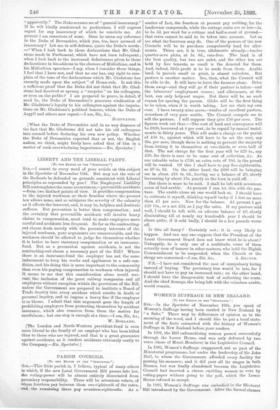PARISH COUNCILS.
[To TWO EDITOR OP THE SPECTATOR." J Sin,—This little parish is, I believe, typical of many others in which, if the new Local Government Bill passes into law, the voting-power will be almost entirely dissociated from pecuniary responsibility. There will be seventeen voters, of whom fourteen pay between them one-eighteenth of the rates, and the remaining three pay seventeen-eighteenth.e. As a matter of fact, the fourteen at present pay nothing, for the landowner compounds, while the cottage rents are so low—ls. to ls. 3d. per week for a cottage and half-a-rood of ground— that rates cannot be said to be taken into account. Let us see what the fourteen may do. One of the powers of the new Councils will be to purchase compulsorily land for allot- ments. There are, it is true, allotments already,—twelve quarter-acre plots, at '7s. 6d., rate-free, The land is of the best quality, but two are unlet, and the other ten are held by five tenants, so small is the demand for them. And, indeed, little profit is to be made from them. Arable land, in parcels small or great, is almost valueless. But pasture is another matter. See, then, what the Council will be able to do. It will have to leave the farmers alone. Drive them away—and they will go if their pasture is taken—and the labourers' employment ceases ; and allotments, at the best, can only help-out wages. But there will be no such reason for sparing the parson. Glebe will be the first-thing to be taken, when it is worth taking. Let me state my own case. I have twenty-nine acres,—twelve of excellent pasture, seventeen of very poor arable. The Council compels me to sell the pasture. I will suppose they give £50 per acre. The figures work out thus :—The cost of land and conveyance will be £630, borrowed at 4 per cent., to be repaid by annual instal- ments in thirty years. This will make a charge on the parish of £46 4s., against which will have to be set the rent, say 30s. per acre, though there is nothing to prevent the majority from letting it to themselves at two-thirds, or even half of that. The net charge for the first year will be £28 4s., say £30, for there is sure to be some cost of collection, &c. As our rateable value is £720, an extra rate of 10d. in the pound will be wanted. Of this I shall have to pay five-eighteenths, or £8 Os. 8d. On the other hand, the £600 will be bringing me in about £16 Os. 8d., leaving me a balance of £8, slowly increasing by about 17s. yearly as the loan is paid off.
But there is more to be said. I shall be left with seventeen acres of bad arable. At present I can let this with the pas- ture. The arable alone no one would look at. I should have to cultivate it myself, thinking myself lucky if I lost no more than £1 per acre. Now for the balance. At present I get £2610s., or a net 224, as I pay the rates. If my pasture sold well, I should be left with an adverse balance of £9, slowly diminishing till at nearly my hundredth year I should be about quits ; if it sold badly, I should be a few pounds worse off.
Is this all fancy ? Certainly not ; it is very likely to happen. And can any one suppose that the President of the Local Government Board does not know what be is about P Unhappily, he is only one of a multitude, some of them actually men of honour in other matters, who hold the Eighth Commandment to be suspended, when the Church or the clergy are concerned.—I am, Sir, &a., A RECTOR.
P.S.—I have not considered the case of compulsory hiring instead of buying. The pecuniary loss would be less, for I should not have to pay an increased rate ; on the other hand, I should have the disagreeable task of collecting the rents, And the chief damage, the being left with the valueless arable, would remain.






































 Previous page
Previous page